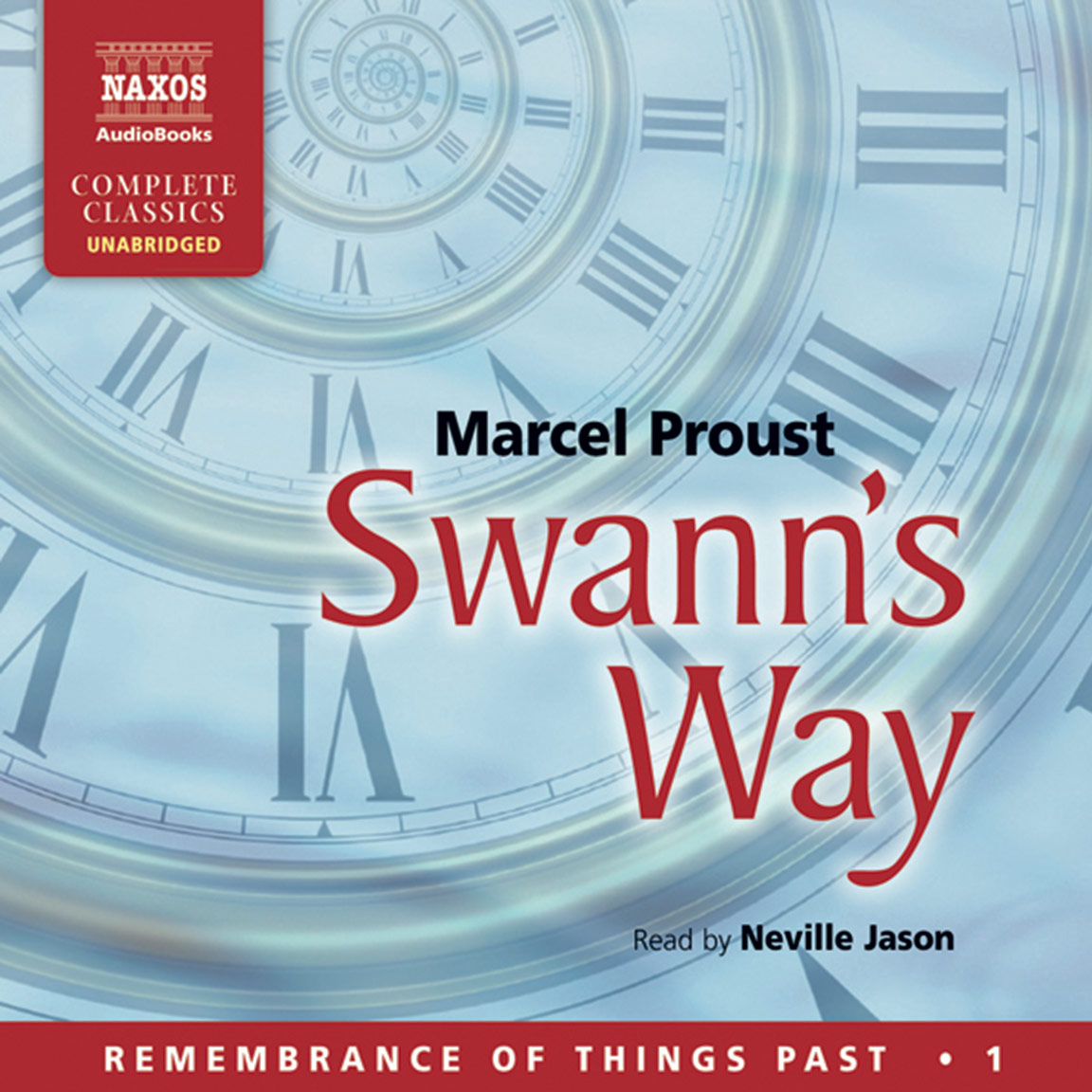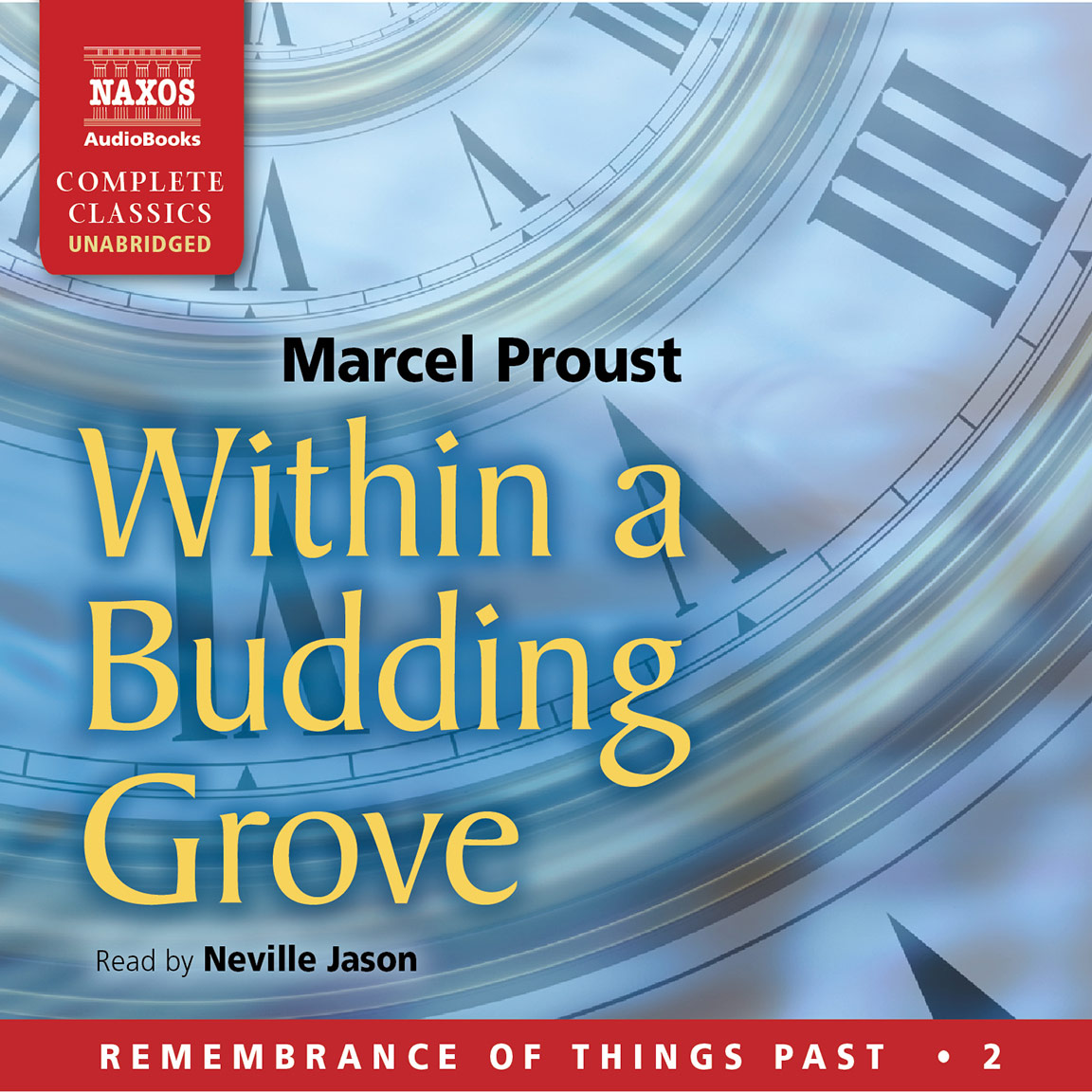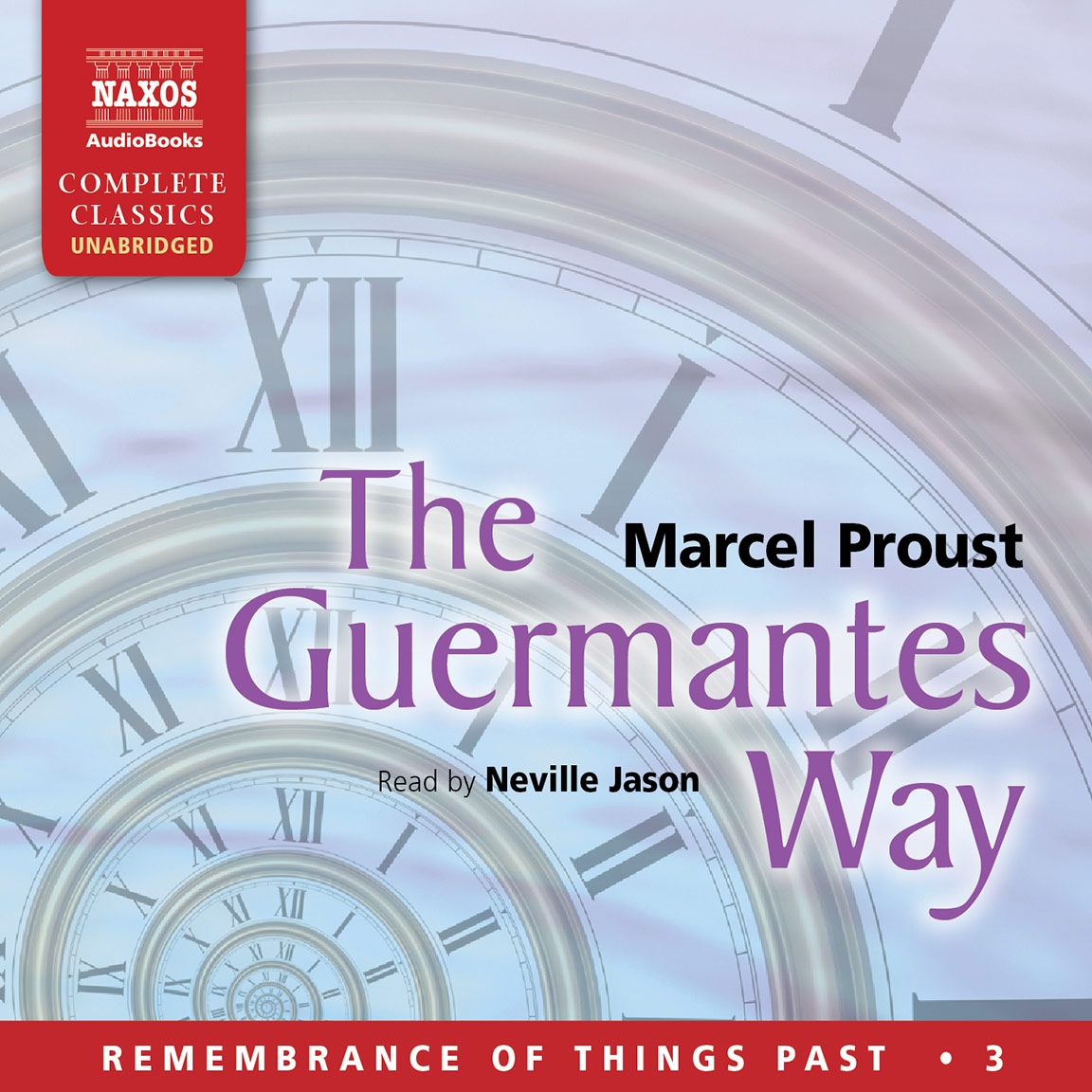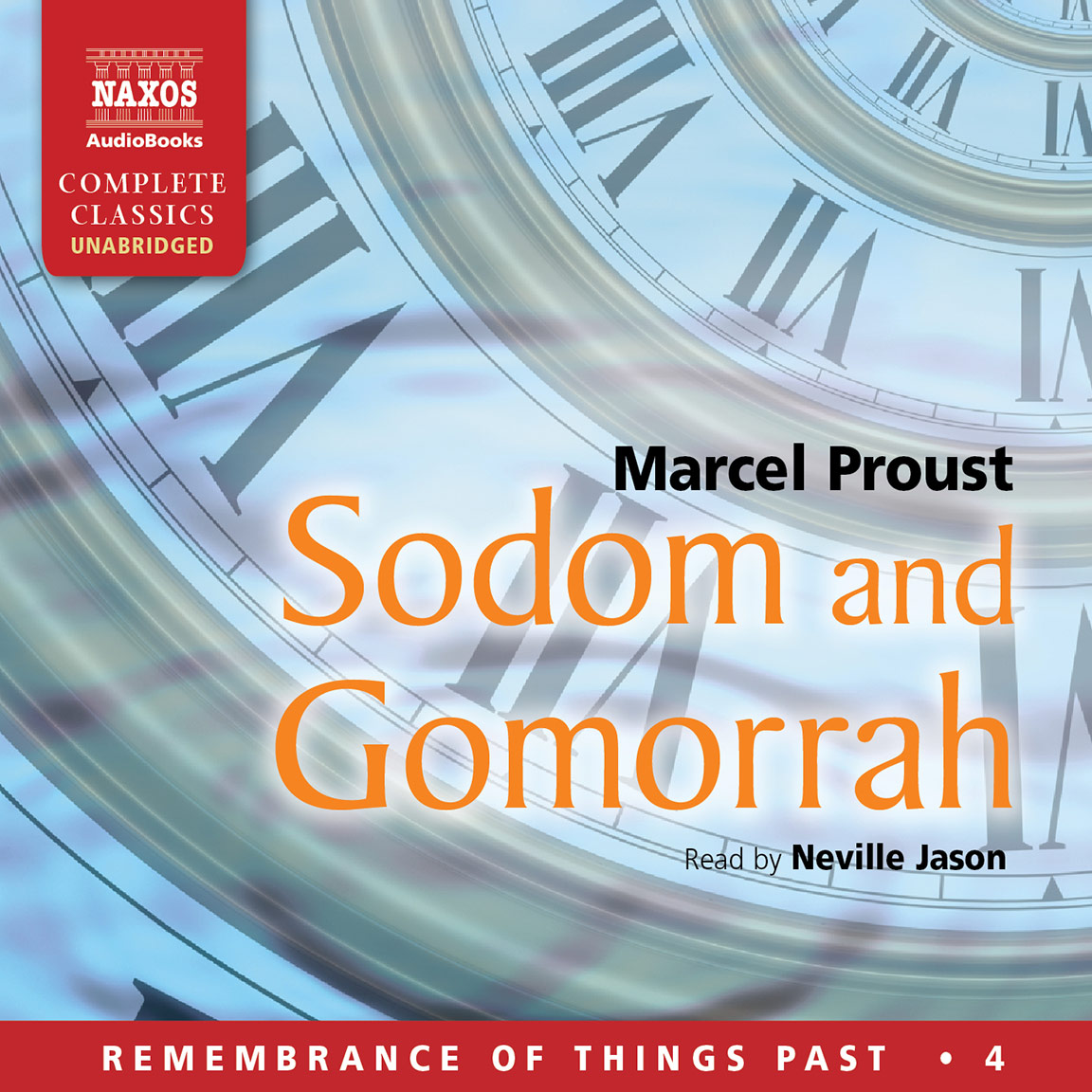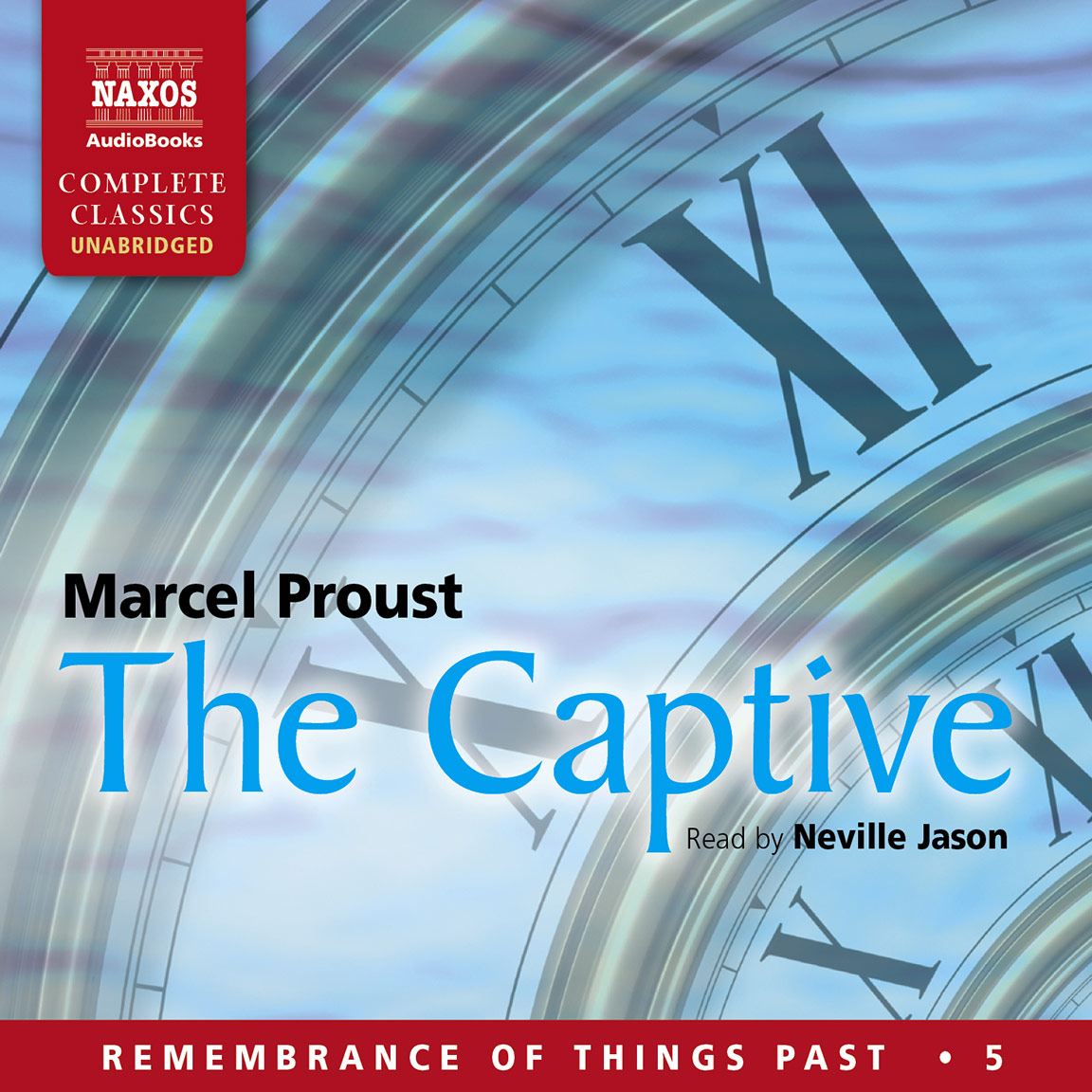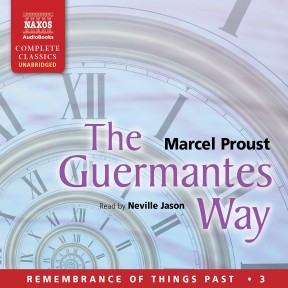
Audio Sample
Marcel Proust
The Guermantes Way
Read by Neville Jason
unabridged
Remembrance of Things Past is one of the monuments of 20th-century literature. Neville Jason’s unabridged recording of the work runs to 150 hours. The Guermantes Way is the third of seven volumes. The narrator penetrates the inner sanctum of Paris high society and falls in love with the fascinating Duchesse de Guermantes. Proust describes vividly the struggles for political, social and sexual supremacy played out beneath a veneer of elegant manners. He also finds himself pursued by the predatory Baron de Charlus. Based on the translation by C. K. Scott Moncrieff.
-
Running Time: 28 h 50 m
More product details
Digital ISBN: 978-1-84379-611-4 Cat. no.: NA0098 Download size: 840 MB Translated by: C. K. Scott Moncrieff BISAC: FIC000000 Released: April 2012 -
Listen to this title at Audible.com↗Listen to this title at the Naxos Spoken Word Library↗
Due to copyright, this title is not currently available in your region.
You May Also Enjoy
Reviews
Naxos AudioBooks continue with their latest instalment from Marcel Proust’s inimitable saga, Remembrance of Things Past in the form of The Guermantes Way. This is the second book of six and is usually split into two, but here we have the whole 23 hours read with inimitable poise by the great Neville Jason.
In The Guermantes Way we explore Marcel’s acquaintance with Parisian high society in the form of the Guermantes family, fabulously rich and with property all over the country. Their estates at the fictional Combray are also a link with Marcel’s past as he recalls those wonderful days of his childhood at that lovely seaside town. We also encounter the predatory Baron de Charlus, who pursues Marcel with his homosexual tendencies.
It goes without saying that Jason is supreme in this Proust unabridged translation and The Guermantes Way is certainly essential listening. One looks forward to further instalments in this series with Sodom and Gomorrah up next.
Gerald Fenech, Malta News Online
Booklet Notes
The critic André Maurois described Proust’s Remembrance of Things Past as ‘one of the greatest works of the imagination of all time’.
The literal translation of the work’s French title, ‘In Search of Lost Time’, contains within it a clue to the creation of this monumental work of biographical fiction. Having wasted time living a dilettante existence in the fashionable world, Proust, in middle age, decided to re-dedicate his life to art, and to attempt at last to achieve the great work of which he knew himself capable.
Remembrance of Things Past was his chance to justify his life, and to cheat death through an act of artistic creation. It was the means he would use to conquer time through recreating his lost years. Memory was the material with which he would weave the magic cord to be launched into infinity; that cord which now binds us to him, and stretches forward into the future, linking his genius to unborn generations.
The Author
Marcel Proust was born on 10 July, 1871. His father, a distinguished professor of medicine, was from a Catholic family, while his mother was Jewish. Although convinced from an early age of his calling as a writer, Proust was riddled with self-doubt and wrote relatively little at the beginning of his career.
During his twenties, he co-founded a short-lived review, Le Banquet; contributed to another literary publication, La Revue Blanche; and in 1896 had his first book published, a collection of essays entitled Les Plaisirs et Les Jours.
He became an enthusiastic admirer of Ruskin and translated his Bible of Amiens and Sesame and Lilies into French. A novel, Jean Santeuil, which was the precursor of Remembrance of Things Past, was abandoned, and eventually published long after Proust’s death, in 1954.
For much of his youth Proust led the life of a man-about-town, frequenting fashionable Paris drawing rooms and literary salons, which were to form the background of a number of his early stories and sketches, and subsequently of Remembrance of Things Past.
The death of his adored mother in 1905 resulted in a nervous collapse and aggravated his chronic asthma and insomnia. But, despite his grief and the sense of loss, from which he never recovered, his mother’s death freed him with regard to his homosexual way of life, and allowed him to address same-sex love in his writing, albeit in a form which treated such experiences as happening to others rather than to himself.
In 1907 he moved into an apartment in the Boulevard Haussmann where, in the bedroom which he had had lined with cork to keep out noise, he embarked upon his great work À la Recherche du Temps Perdu (Remembrance of Things Past). In it the minuteness of his observation, the depth of his psychological understanding and the vividness of his descriptive powers combined to create one of the most poetic and magical works in all literature.
Publication of Remembrance of Things Past
This long autobiographical cycle was originally published in eight sections: Du Côté de Chez Swann (Swann’s Way) in 1913; A L’Ombre des Jeunes Filles en Fleurs (Within a Budding Grove) in 1918; Le Côté de Guermantes I (The Guermantes Way I) in 1920; Le Côté de Guermantes II and Sodom et Gomorrhe I (Cities of the Plain I) in 1921; Sodom et Gomorrhe II in 1922; La Prisonnière (The Captive) in 1923; Albertine Disparue (The Sweet Cheat Gone/The Fugitive) in 1925 and Le Temps Retrouvé (Time Regained) in 1927.
Proust was obliged to publish Swann’s Way at his own expense, and even after it had appeared, had trouble finding a publisher for the next part, A L’Ombre des Jeunes Filles en Fleurs. However, when it appeared in 1918 it received considerable acclaim, and was awarded the Prix Goncourt the following year.
By the time Proust died, on 18 November, 1922, the first four parts of the cycle had been published, leaving the others to appear posthumously.
The Guermantes Way – Part I
In The Guermantes Way, Marcel penetrates the inner sanctum of Paris high society, the circle of the Faubourg Saint-Germain, which he has hitherto viewed as both unattainable and quasi-magical; a place inhabited by beings who lead lives completely unlike his own and those of other ordinary mortals.
Marcel’s unexpected social advancement is brought about by a combination of circumstances. His family has moved to an apartment which forms part of the Hotel de Guermantes, the Paris residence of the Duc and Duchesse de Guermantes, whose country estates are at Combray, where Marcel’s family used to spend their summers when he was a child.
More recently, while Marcel was on holiday at the seaside resort of Balbec with his grandmother, the old lady renewed the acquaintance of a friend of her youth, the Marquise de Villeparisis, aunt of the Duchesse de Guermantes. The Marquise has introduced Marcel to her nephew, Robert de Saint-Loup, a stylish young officer cadet who delights in the intellectual and artistic stimulation he finds in Marcel’s conversation.
Marcel’s new neighbour in Paris, the Duchesse de Guermantes, is sufficiently young, attractive and unobtainable to become the safe object of his youthful adoration, and although he is unable to avoid noticing that she is a real woman with a disagreeable expression and a faulty complexion, fantasy outweighs reality. Marcel has long been obsessed by the grandeur of the Guermantes family, and in his imagination the Duchess becomes a magical being. Marcel’s obsession drives him to take his morning walk at the same time as the Duchess takes hers, in order to meet her as though by accident. However, the Duchess appears, if anything, rather more annoyed than pleased by his attentions.
Having been invited by the officer cadet Robert de Saint-Loup to visit him in the garrison town where he is stationed, Marcel finds fascination in army life, with its physical rigour and rough camaraderie. He is reminded that Oriane, Duchesse de Guermantes, is Robert’s cousin, and although reluctant to admit to Robert the extent of his love for her, he obtains from him the promise of an introduction on their return to Paris.
Robert’s mistress is an aspiring young actress, and he is impatient for Marcel to meet her. When they are introduced Marcel is shocked to realise that he has seen her before. This woman so adored and admired by Robert, on whom he lavishes priceless jewels and for whom he defies his family’s displeasure, turns out to be ‘Rachel when from the Lord’, the intelligent Jewish prostitute he first met in a brothel. Despite his view of Rachel as unworthy of Robert’s love, Marcel can see that the emotions she engenders in him are both genuine and devastating.
When they pay a visit to the theatre to see Rachel perform, Marcel observes with fascination the magical transformation made by distance and art, and begins to understand Robert’s passion for her. Robert’s relationship with Rachel is a stormy one, due to his jealous nature and her seeming need to provoke it, and Marcel is made an unwilling witness of their complicated emotional life.
The scene of Marcel’s introduction to high society is the salon of the Marquise de Villeparisis. Not only is the Marquise Robert’s aunt and his grandmother’s old friend, but Marcel discovers another link between them, in that the Marquise’s lover of many years’ standing is the Baron de Norpois, his father’s old friend and colleague.
The Marquise’s salon represents the ‘Guermantes Way’ of the title – the way of the aristocracy. At Combray, Marcel and his parents were in the habit of taking two country walks; one, Swann’s Way, which led past the property of Swann, his wife Odette and their daughter Gilberte, and the other, the Méséglise Way, which skirted the Guermantes family’s extensive estates. These two different routes came to symbolise two ways of life for Marcel: the bourgeois life of love and family, and the life of power and influence which comes with noble birth.
In The Guermantes Way, Proust shows us the struggles for political and social supremacy; the ebb and flow of power and influence being played out in the Marquise’s drawing room beneath a veneer of elegant manners, almost Oriental in their subtlety.
Characters from former books are reintroduced, and among them we meet once again the arch snob and flatterer Legrandin who, having warned Marcel about the dangers of going into society, is found to have been tirelessly attempting to obtain entry himself; Marcel’s old friend, the scholarly and brilliant but socially inept Bloch; and the predatory Baron de Charlus, whose homosexual interest in the innocent Marcel excites his hostess’s concern.
Amongst the subjects currently under discussion in the Marquise’s salon is the Dreyfus case. Bloch, who is attending the trial of Emile Zola, eminent champion of Dreyfus, is anxious to sound out the company’s opinions. The case has divided France into two opposing camps – with the aristocrats of the Faubourg Saint-Germain solidly arrayed on the anti-Dreyfus side. The opinion expressed by one nobleman present is that Dreyfus can be neither patriot nor traitor, because as a Jew he is not a Frenchman. This argument must have been particularly offensive to the half-Jewish Proust.
Part One of The Guermantes Way ends with the illness of Marcel’s grandmother, whose selfless love has been as important to him as that of his mother, and his dawning realisation that the time is approaching when he must lose her.
The Guermantes Way – Part II
Marcel’s grandmother is in failing health. Having been advised by an important consultant that, despite her inclinations to the contrary, she is well enough to take some fresh air, she sets out for a walk in the Champs Élysées with Marcel, during the course of which she is taken ill.
Marcel, who guesses his grandmother has suffered a stroke, seeks assistance from an eminent doctor, Professor E., an acquaintance of his parents whom he meets by chance in the street.
Proust’s somewhat cynical attitude to doctors is exemplified by his description of the character of the Professor, as it is in his treatment of other members of the medical profession elsewhere in the novel. Vain, fussy and opinionated, the Professor may be professionally competent but he lacks real human sympathy and understanding. His power to cure, too, is extremely limited. However, as Proust remarks of humanity’s eternal optimism: ‘we continue to light candles and to consult doctors.’
Proust’s father was a distinguished physician and public health official, and the medical members of his father’s circle, together with the numerous doctors Proust himself was obliged to consult as a result of his poor health, would have provided the author with ample opportunity to study the profession at first hand. His detailed account of sickroom procedure and of the physical decline of Marcel’s grandmother indicates his familiarity with the treatment of a chronic invalid.
Marcel’s beloved grandmother dies. After a period of mourning, youth and nature combine to assist Marcel in his recovery, and a change of season brings a change of mood. Physical desire prompts thoughts of encounters with the female sex, and he plans a romantic dinner with Mme de Stermaria, an attractive young divorcée whose acquaintance he made at Balbec, and whose sexual availability has been hinted at by Robert de Saint-Loup. But his plans misfire and, surprisingly, it is with Albertine that the sexual encounter takes place. Although Marcel is no longer in love with her, as he was at Balbec, Albertine appears to have matured physically and in other ways, which leads Marcel to believe (as it turns out correctly) that she would not, as before, repel his advances.
Robert de Saint-Loup, just returned from Morocco on leave, takes Marcel off to dine. The café to which they go numbers among its clients a group of young intellectuals, of whom Marcel’s old friend Bloch is a member, and a sprinkling of young aristocrats, of whose arrogance and anti-Semitism Marcel is made aware but against which his friendship with Saint-Loup provides protection.
During his grandmother’s illness, Marcel’s mother has taken him to task for making a fool of himself chasing after the Duchesse de Guermantes, and Marcel’s infatuation with the unattainable older woman fades. But once the spell is broken and Marcel’s assumed indifference becomes genuine, the Duchess begins to take an interest in him and invites him to dine with her and her husband the Duke.
This gives Marcel the opportunity of which he has always dreamt: witnessing the charmed life of the members of the Faubourg Saint-Germain, that almost hermetically sealed circle of France’s noblest aristocracy. But this experience proves very different from the one he has anticipated, and Marcel is forced to observe the chasm between the resounding titles which symbolise France’s historic greatness, and the fallible personalities who inhabit them.
Marcel is invited to a late night rendez-vous with the Baron de Charlus, which turns out to be a very unpleasant meeting. In his innocence, Marcel has unwittingly rejected the advances of the Baron, which puts the Baron in a rage. In a hilarious episode, Marcel reacts to the Baron’s unjust attack with a furious display of temper, and trashes the Baron’s new hat. The Baron, taken aback, softens his manner, and an uneasy truce is reached.
De Charlus was based by Proust on two real-life models, but nonetheless remains a wonderfully imaginative creation. Proust’s description of the tension caused in the personality of Charlus by the repression of his publicly unacknowledged homosexuality; his need to emphasise his masculinity through acts of physical virility; his attempt to counteract feelings of shame through asserting his social and intellectual superiority over others and his vicious attacks on the weakness he observes in others but so strenuously denies in himself, shows the author to be not only a great writer, but a remarkable psychologist.
The final section of Part Two of The Guermantes Way reintroduces the figure of Swann, now much altered by a life-threatening disease. Swann pays a visit to the Duchesse de Guermantes, with whom he shares the wit and intelligence that has made them allies in the past. In the face of Swann’s revelation regarding the state of his health, the Duchess is torn between her social obligation to be on time for a dinner party and the necessity of considering Swann’s news with appropriate seriousness. She opts for the former, despite eventually being obliged to delay her exit for a much more mundane reason: the necessity of changing her shoes. In making her decision to ignore Swann’s illness in favour of a dinner engagement, she is following not only her husband’s wishes, but the dictates of a social order which override her personal inclination, a fact recognised by Swann, who has led his life according to the same rules. The Duke and Duchess’s outer forms of courtesy and consideration hide a deep selfishness, the result of their self-indulgent manner of living and an ingrained conviction that they are different from, and superior to, other people – especially those who do not inhabit their world.
We are left with the feeling that Proust may not approve of the people who inhabit the upper reaches of society, but that, like Swann, he understands them. Marcel may have discovered that they are not the magic figures he imagined them to be, but he sees them nonetheless as part of a historical continuum, and finds the same fascination in their world as in ‘a herbarium, filled with plants of
another day’.
The author is well aware that snobbery, arrogance, pride, selfishness and cruelty are not unique to the aristocracy. We may not share the wealth and privilege of the gently-born, but as human beings we share their failings, and Proust appears to invite those among us without sin to cast the first stone.
The Life and Work of Marcel Proust
To avoid any confusion, it may be helpful to point out that Proust’s great work, À La Recherche du Temps Perdu, was originally translated into English by Charles K. Scott-Moncrieff and published in 1922 under the title, Remembrance of Things Past. It was subsequently re-translated by Terence Kilmartin and appeared in 1981 as In Search of Lost Time. In 2002 a new edition appeared under the same title, with each volume assigned to a different translator. The Naxos AudioBooks recordings use the Scott-Moncrieff text and, in references to the work, I use Scott-Moncrieff’s title.
My own contact with Proust began when, as a 17-year-old schoolboy, I first read Swann’s Way. I could not have guessed then that, many years into the future, Proust would take over my life to such an extent. Over a six year period during the 1990s, I abridged and recorded Remembrance of Things Past for Naxos Audiobooks, for whom I have now recorded this entire, uncut text.
When I was asked to write The Life and Work of Marcel Proust (see www.naxosaudiobooks.com), it occurred to me that, although the people on whom Proust based his characters were no longer living, the places he wrote about were still there, and so I travelled to France to see them.
I was delighted to discover that Illiers, where Marcel Proust spent his holidays as a child, and which figures in the book as Combray, is now marked on maps and road signs as Illiers-Combray, in official recognition of the reason for this sleepy village’s wider fame.
In a narrow street just off the market square in Illiers-Combray is the house in which Proust’s father, Adrien Proust, was born, and further along is the house of his aunt Élisabeth, now a Proust museum, where Élisabeth’s fictional counterpart, the bedridden Aunt Léonie, watched the world go by from her bedroom window. Around the corner from the house is a little boulangerie with a sign in the window announcing proudly: ‘This is where Aunt Léonie bought her madeleines’. It only occurs to me as I buy a packet of the scallop-shaped cakes, that Aunt Léonie is a creature of fiction. Never mind, Aunt Élisabeth might well have patronised the establishment, or one very like it. Up the hill there is a real house called Tansonville, the name of the house occupied by Charles Swann, and later by his daughter Gilberte and her husband Robert de Saint-Loup, and further on there is a real village called Méréglise, a name almost identical to the fictional Méséglise.
Water lilies are still reflected in the glassy surface of the river Loir, which in the book bears the more poetic name the Vivonne, and beyond the stream lies the Pré Catalan, the enchanting park created by Proust’s horticulturally minded Uncle Jules. From Illiers I travelled on to Cabourg, a seaside resort on the Normandy coast, the original of the fictional Balbec. Here I found the Grand Hotel in all its Edwardian splendour. It was rebuilt after Proust spent holidays there as a child, but he returned as an adult, and sections of Remembrance of Things Past were written beneath its roof. As in Within a Budding Grove, the great glass windows of the restaurant look out over the promenade to the beach below, and with a little imagination, that group of budding young girls in bikinis is transformed into the little band of ‘jeunes filles en fleurs’ outlined against the sea.
I travelled on to Paris, visiting 102 Boulevard Haussmann, Proust’s home for many years, where he wrote so much of Remembrance of Things Past. The building is still owned by the same bank that purchased it from Proust’s aunt, when her inconsiderate decision to sell it forced him to move. His bedroom is still there, but unfurnished, and to see the room as it was, one is obliged to visit the Musée Carnavalet, where his bed, chaise-longue and other effects are displayed in a reconstruction of the famous
cork-lined room.
A walk to the gardens of the Champs Élysées brought me to an area with a sign announcing that I am in the Allée Marcel Proust. Children chase each other – perhaps playing the modern equivalent of ‘prisoners base’, the game played by Gilberte and her friends. This is where the real Marcel played as a child with the real Marie de Benardaky, with whom he fell in love, just as the fictional Marcel falls in love with the fictional Gilberte Swann.
In the real world the same spaces are occupied now by different people. Time has moved on, but places remain, and we have the privilege of being present in not only the imaginary world Proust created, but that portion of the real world which had a part in its creation. His presence has left behind a trace of magic, and we see places differently, because we see them through his eyes. One day those places will have crumbled into dust, as will we ourselves, and the space we now consider ours will be occupied by others. But as long as civilisation remains, those who come after us will be able to share Proust’s vision and enter his world. Proust was aware that art is the only true reality, and that through his creations the artist continues to live after his death, beyond space and beyond time.
Notes by Neville Jason

